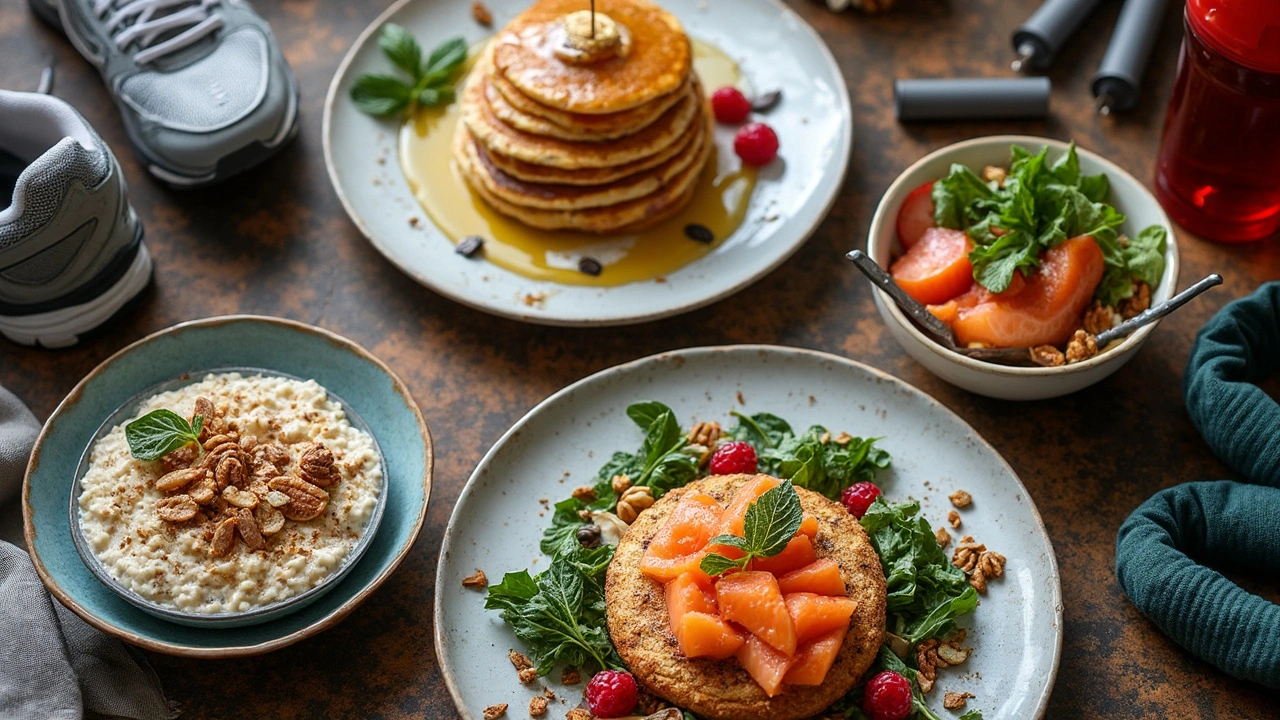Skipping breakfast isn’t really an option when you’re pushing your body to perform, whether you’re sprinting in track meets or sweating it out in the gym. The right breakfast sets the whole tone for your day. Instead of a sugar-loaded cereal or skipping food altogether, athletes actually need a steady mix of protein, complex carbs, and healthy fats. No, a banana alone won’t cut it—your muscles are hungry for more.
Ever notice how you hit a wall during a workout when you didn’t eat enough? That’s your body reminding you: fuel matters. The goal isn’t to pile on empty calories, but to nourish the body with foods that digest at a steady pace and support muscle recovery. It’s not about fancy superfoods or hard-to-find ingredients either. What you need are real foods—think eggs, oatmeal, Greek yogurt, nut butters, and fruit—put together in ways that taste good and keep you going. And you don’t have to wake up at dawn to make it happen, either.
- Why Athletes Can't Skip Breakfast
- Macros That Matter: Building a Balanced Plate
- Real Breakfast Ideas That Work
- Tips for Busy Mornings and Meal Prep
Why Athletes Can't Skip Breakfast
Breakfast isn’t just some old-school tradition—it’s a must-have for anyone who’s serious about sports or staying active. For athletes, skipping that first meal can actually mess with mood, focus, and those early-morning training results you work so hard for. After hours of sleep, your body’s basically run out of easy fuel, and you need to restock or your performance crashes before you even get going.
Studies from the International Society of Sports Nutrition point out that kids and adults who eat a good breakfast perform better in everything from endurance to short, explosive sprints. Without that morning boost, your muscles struggle to recover and grow. Even worse, skipping meals messes with blood sugar, leading to sluggish reactions and a total energy dip halfway through practice or a game.
“Athletes require a morning meal to replenish liver glycogen and supply glucose to the brain and muscles. Skipping breakfast has been linked to slower reaction times and decreased overall performance.” — International Society of Sports Nutrition
This isn’t just theory. Here’s what actually happens if you ditch breakfast as an athlete:
- Mental sharpness drops, and focus during drills or matches is harder.
- Workout recovery takes longer. Your muscles need nutrients ASAP after you wake up.
- The risk of mid-morning cravings goes way up, and you end up overeating junk later in the day.
- Metabolism slows down; you burn fewer calories overall.
If you’re fueling up for a 6am swim or have a long day packed with classes and training, a quality healthy breakfast sets you up for steady energy, better results, fewer injuries, and more fun doing what you love.
| Breakfast Eaters | Breakfast Skippers |
|---|---|
| Higher endurance during morning workouts | Fatigue and lower stamina |
| Better attention and reaction speed | Slower focus and poor coordination |
| Improved muscle recovery | Soreness lingers longer |
In short, if you want to get the most from your training and stay at the top of your game, don’t even think about skipping that healthy breakfast. Your body and brain will thank you by lunchtime.
Macros That Matter: Building a Balanced Plate
Getting your macros right at breakfast is a game changer for healthy breakfast success. Athletes’ bodies don’t just crave calories—they need the right mix of macronutrients: proteins, carbohydrates, and fats. Here’s what each brings to your breakfast table:
- Protein helps you repair and build muscle. It also keeps you feeling full longer. Good sources for athletes in the morning are eggs, Greek yogurt, cottage cheese, nut butter, or a scoop of whey protein in a smoothie.
- Carbohydrates give quick and lasting energy. Not all carbs are the same, though. Stick to complex carbs like oatmeal, whole grain toast, or fruit. They digest slower and keep your energy steady instead of making you crash mid-practice.
- Healthy fats (like avocado, nuts, seeds, and olive oil) support brain health and help your body use vitamins and minerals better. They also slow down the digestion of carbs so your blood sugar stays stable.
The trick is balancing all three, not overloading on just one. Here’s a no-fuss way to look at it: your plate should be about half carbs, a quarter protein, and a quarter fats. Need something more specific? Check this out:
| Nutrient | Recommended Amount (per meal for athletes) | Example Sources |
|---|---|---|
| Protein | 20-30g | Eggs, yogurt, turkey sausage |
| Carbohydrates | 40-60g | Oats, fruit, whole wheat bread |
| Fats | 10-15g | Avocado, almonds, peanut butter |
If you’re in the middle of a heavy training week, you might want more carbs for extra energy. For lighter days, bump up the protein and healthy fats to help muscles recover. Remember, no one gets it perfect every day, and small changes can make a big difference over time. The real win is finding combos that you and your body actually like, so you’ll stick with it when you need energy foods most.

Real Breakfast Ideas That Work
If you're after healthy breakfast options that hit the mark for athletes, you don’t need complicated recipes or expensive ingredients. You just need smart combos that balance carbs and protein while actually tasting good.
- Oatmeal Power Bowls: Start with old-fashioned oats—they’re slow-burning carbs, which help fuel workouts. Add chopped almonds or walnuts, a scoop of Greek yogurt for extra protein, and top it with berries. For even longer-lasting energy, swirl in a little peanut butter or chia seeds.
- Egg & Veggie Wraps: Scramble two eggs with chopped spinach, bell peppers, and onions. Toss it all into a whole wheat or high-protein wrap. Eggs bring the protein, the wrap brings the carbs, and the veggies round out the nutrients. Super easy to eat on the way to morning practice, too.
- Greek Yogurt Parfaits: Stack Greek yogurt, your favorite granola, and sliced banana or strawberries in a jar. Granola bumps up the carbs. Yogurt is full of muscle-repairing protein and a bit of natural sugar to kick your brain into gear.
- Nut Butter Toast: Grab whole grain bread (not the squishy white stuff) and layer on almond or peanut butter. Add sliced banana for potassium—which helps stop muscle cramps—or a sprinkle of seeds for crunch. Fast, simple, and way better than a plain toast.
- Cottage Cheese Fruit Bowls: Pour low-fat cottage cheese into a bowl and top with pineapple, peach, or berries. Add pumpkin seeds if you want a little texture. The mix of dairy protein and fruit carbs makes this perfect for a light but powerful start.
- Make-Ahead Muffins: Bake whole wheat banana or zucchini muffins on the weekend. Sneak in protein powder or ground flaxseed for an extra boost. These are grab-and-go lifesavers for busy athletes who barely have time to sit before school or practice.
Wondering what athletes actually eat? According to a recent survey of U.S. college athletes, oatmeal and eggs rank as the most common breakfast staples on competition days. That’s no accident—both give a solid mix of energy and muscle support. Here’s a quick table to show how some favorite healthy breakfast ideas stack up on protein and carbs:
| Meal | Protein (grams) | Carbs (grams) |
|---|---|---|
| Oatmeal w/ Yogurt & Nuts | 18 | 50 |
| Egg & Veggie Wrap | 20 | 35 |
| Greek Yogurt Parfait | 17 | 40 |
| Nut Butter Toast w/ Banana | 9 | 35 |
| Cottage Cheese Fruit Bowl | 13 | 28 |
Try doubling recipes and storing single-serving containers in the fridge. That way, if you’re running late or your kids (like Lorelei and Bryce) have early sports, you’re not tempted by drive-thru breakfasts that leave you crashing before noon.
Tips for Busy Mornings and Meal Prep
Juggling workouts, school runs, and work is no joke. As a mom, I get how tough it is to put together a healthy breakfast on those mornings when everyone’s running late. The real key? A little planning the night before—seriously, just 10 minutes can save your sanity and keep your athlete fueled.
- Batch Cooking: Make things like overnight oats, egg muffins, or whole grain pancakes in advance. Store them in the fridge or freezer and just grab, reheat, and go.
- Set Up a DIY Breakfast Station: Have containers of chopped fruit, nuts, and granola so athletes (and hungry kids like Bryce and Lorelei) can build quick parfaits with Greek yogurt or cottage cheese.
- Portable Options: Prep wraps using whole wheat tortillas, scrambled eggs, spinach, and cheese—they’re easy to eat on the way to practice or school.
- Keep It Simple: Not every breakfast has to look like a café menu. Toast with nut butter and banana, plus a hard-boiled egg, totally does the job.
If you’re worried about time, you’re not alone. Actual studies from the National Institutes of Health found that athletes benefit from prepping meals ahead—reducing morning stress and missing far fewer breakfasts.
"Consistency matters more than complexity. When athletes have reliable, go-to meals prepared in advance, their performance and focus increase dramatically." — Dr. Stacy Sims, exercise physiologist and nutrition scientist
Here’s a quick comparison of easy sports nutrition breakfast choices you can prep in under 15 minutes:
| Meal | Prep Time | Main Nutrients |
|---|---|---|
| Overnight Oats with Fruit & Seeds | 5 min (night before) | Carbs, Fiber, Protein |
| Egg Muffins with Spinach & Cheese | 10 min bake time | Protein, Iron, Calcium |
| Peanut Butter Banana Toast | 3 min | Protein, Healthy Fats, Carbs |
| Greek Yogurt Parfait | 2 min | Protein, Calcium, Probiotics |
Meal prep isn’t just for pro athletes. If you keep your kitchen stocked with easy, nutrient-packed basics, putting together a healthy breakfast gets way simpler—even when you’re half-awake and the morning feels like chaos. The goal: Less time stressing, more time powering up for the day.







